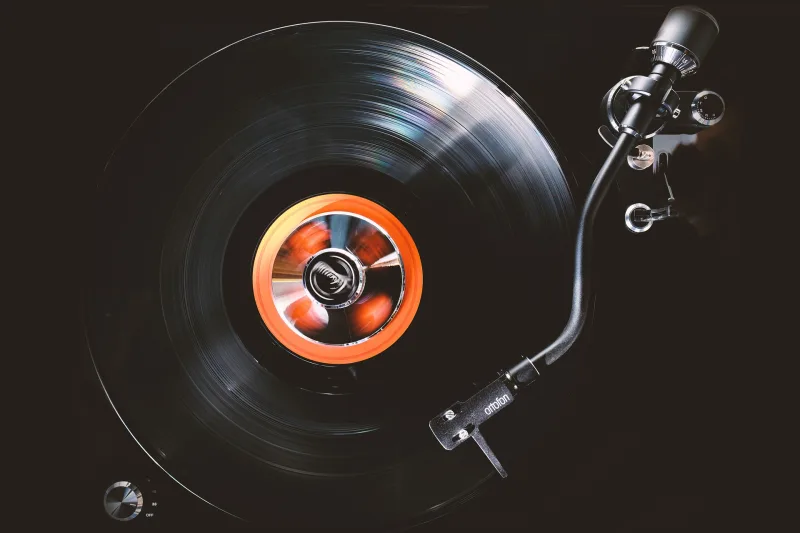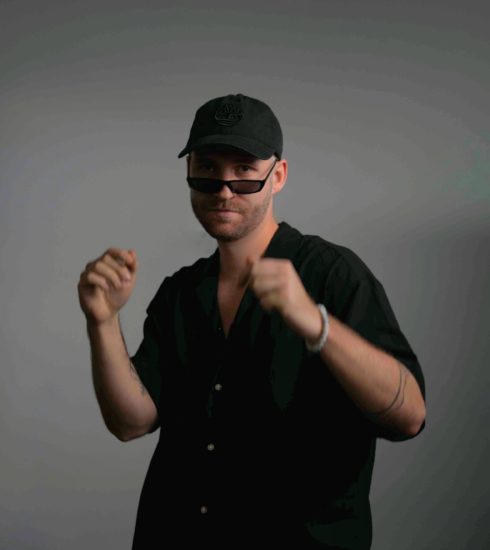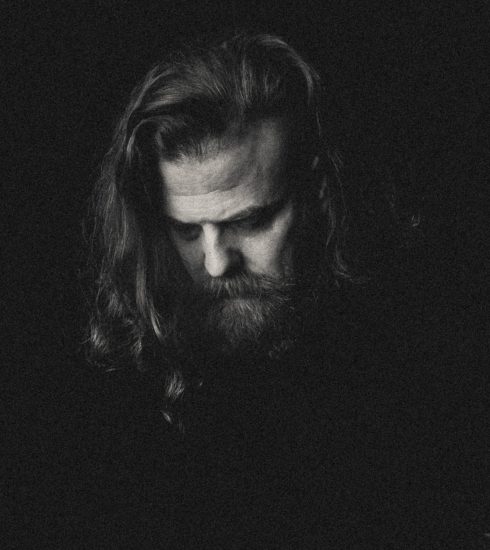“La música es mi alma”: Ihor Tselyp habla sobre la guerra, el pueblo y cómo la creatividad te salva en los momentos más difíciles.
Tiempo estimado de lectura: 15 minutos
(eng)
Ukrainian singer Ihor Tselyp, originally from a small village in the Ternopil region, speaks openly about how the war changed his life, why he’s proud of his rural roots, and how he balances physical labor with music every day. His journey is like skating on thin ice — but with faith in himself, in music, and in the belief that what’s real never disappears.
In this in-depth interview, Ihor shares his story, childhood memories, present-day challenges, and his plans for the future.
Ihor, how did your musical journey begin? What inspired you to start creating?
Music has been with me since childhood. I remember singing at school events and dreaming of performing on a big stage. My parents inspired me — they supported every step I took. And, of course, the artists I listened to. For me, music is a way to express emotions and share them with others.
Do you remember your first public performance? What was it like?
It was a school concert. I was very nervous because it was my first big performance. But when I started singing, all the fear disappeared. I remember the smiles in the audience — that gave me confidence to keep going.
Was it easy to balance studying and music?
Not always. There were many moments when I wanted to quit everything and focus only on music, or vice versa — concentrate fully on studies. But I learned to manage my time and find balance. That combination helped me become more disciplined and organized.
The war changed many lives. How did it affect your creativity?
The war is a huge challenge for everyone. It forced me to rethink a lot. I now understand that music isn’t just entertainment — it’s a way to support people and give them strength. That’s made my music even more sincere and deep.
How did the full-scale war affect your life as an artist?
It deeply impacted the music industry, and I felt it too. Many concerts were canceled, and it became harder to connect with audiences due to emotional fatigue. Today, creativity requires more investment than it generates. But I believe it’s important to invest in music — not just financially, but to ensure Ukraine’s voice is heard far from home. For me, it’s a personal path that helps me get through tough times and unite people.
You combine creativity with physical labor. How do you manage that?
It’s not easy, but I’m used to a tough schedule. Physical work helps stabilize finances, while creativity is my soul. I plan everything carefully: after my shift — I rehearse or write songs. It’s not about exhaustion — it’s about meaning. Because when I sing, I feel alive. Ice is a symbol for me — of challenges that seem cold and hard, but if you keep going, you’ll get through.
Has your musical style or themes changed because of what’s happening in Ukraine?
Definitely. I now write more about emotions, pain, and hope. My songs have become more personal, yet also universal — so anyone can find something of their own in them.
Do you manage to stay connected with fans during such hard times?
It’s tough, as people experience things differently now. But I try to stay open, communicate through social media, and share not just music, but my thoughts. I believe art can unite us even in the darkest times.
Do you remember how you earned your first money from music?
Yes, I was still a teenager. I performed at small local events. I spent my first earnings on a microphone. It was more than just a purchase — it was a decision to keep going. Every such step was like an inch of ice conquered — leading toward the big stage.
What “invisible” jobs did you have before pursuing music full-time?
I did a bit of everything — worked in cafés, as a salesperson, and even organized small events. Each of these jobs taught me not to be ashamed of honest work. That experience gave me discipline, empathy, and an appreciation for every resource I have. And it reminded me to never forget where I came from, even if the road gets slippery.
What’s your goal now?
I want music to become my main profession. I’m developing a restaurant business, but I dream of earning a living through creative projects — performances, releases, maybe my own label. I’m ready to invest in myself, to grow and learn. The ice I’m crossing now is making me stronger. Every day is another step toward the dream I believe in.
You grew up in a village. How do you view that experience now?
The village is my roots, my foundation. It’s where I learned to work, respect people and nature. A place where you run barefoot through the dew and help with the chores. Every day is something real. The village gave me strength and character. I’ve never been ashamed of where I come from.
Is it true you loved taking care of animals?
Yes! I always ran to the chickens, cats, and dogs. There’s something very alive about waking up with the sunrise and hearing everything around you wake up too. It was peaceful in a way you rarely find today. That’s my memory of love.
But you decided to leave. Why?
Love for the village is one thing. Opportunities — another. If you want a stage, the city is where it happens. There are more connections and chances there. It was scary and hard, but I knew — if I don’t try, I’ll never know. So I followed the dream, even though my heart stayed at home.
How has the village shaped your adult life?
It made me tough. In the village, there’s no time to be lazy. If you have to get up at 5 a.m., you do it. That’s where I learned to work, endure, and not complain. When I moved to the city, it was hard — but I survived because I had that rural character: strong and persistent.
Do you visit your village often?
Yes. My family is there: my mom, grandma, brother. It’s a place where I can just be myself. Silence, nature, home-cooked food — it’s not just rest, it’s a soul reset. Every time I return, I come back stronger.
If you had the choice, would you live in the village or the city?
If the opportunities were the same — I’d stay in the village. But for now, my career dictates the terms. There’s more work and connections in the city. But as soon as I can afford not to chase opportunities — I’ll return. That’s where I’m truly myself.
How has the war affected your income from music?
The war hit the music industry hard. Many shows were canceled, and connecting with audiences got harder. Now, music requires more investment than it generates. But I keep investing, because it’s not just about money — it’s about making sure Ukraine’s voice is heard, even in the darkest times. It’s my way of supporting myself and others.
How do you balance heavy physical work and music?
It’s hard, but I’m used to it. I work in construction — it’s stable. And music is my soul. After my shift, I write songs or rehearse. I schedule everything carefully — you can’t survive without discipline. Sometimes I feel drained, but music revives me. It lifts my spirit, even when my body’s exhausted.
Do you remember your first money from music? What did you spend it on?
Of course! It was small fees for local performances. But I was so happy. I spent the first money on a microphone. That was a huge milestone for me. It symbolized the beginning of my path. I still have it.
What other jobs did you do before construction?
A bit of everything: cafés, retail, event planning. Each job gave me new experiences and inspiration. Watching people, I learned how much emotion can go into a song. Now I know — no job is ever wasted if it leads you toward your dream.
How do you see your financial future?
Simple: I want music to become my main source of income. Yes, I’m still developing a restaurant business, but music is my priority. I dream of my own label, creative stability. I’m ready to work hard for it. Every challenge today is laying the foundation for tomorrow’s success.
What creative goals do you have for 2025?
In 2025, I’m working on a conceptual album — kind of a musical confession. It’s about what I’ve lived through, internal transformations, war and hope. It’s an ambitious project I’ve carried inside me for a long time. Another major goal is launching a restaurant called Namysto — a place where Ukrainian traditions will live on in a modern world.
Will you experiment with styles and genres?
Absolutely! I plan to mix pop aesthetics with rock, jazz. I want my music to sound fresh. And I dream of collaborations — with rappers, orchestras… why not? The main thing is to keep moving forward.
Imagine you can perform only one song for future generations. What would it be?
It would have to be something that leaves a mark. Maybe one of my own songs — about hope and humanity. But if it’s a classic — then “Imagine” by Lennon. There’s a simplicity in it that speaks of something very complex.
Do you have any rituals before performing or writing songs?
Yes. Before writing, I sit in complete silence. Silence is the best source of music. And before performing, I drink tea with honey. It’s something familiar, cozy — and it reminds me to stay real, not to play a role.
What’s the weirdest or funniest comment you’ve ever received?
One listener wrote: “Your song is my alarm clock. I wake up like it’s a concert!”
I laughed a lot. But you know, if music helps people start their day — that’s already a win.
How do you deal with haters?
Haters are also a sign of success. If no one hates you, then no one notices you. I listen to them, but I don’t let them affect my path. Any reaction motivates me. Music is about emotions — if there’s a response, it means I’m doing something right.
About Ihor Tselyp:
Ihor Tselyp is a well-known Ukrainian singer, winner of the show “Karaoke on Maidan” (2018), and a laureate of numerous music competitions in Ukraine and abroad. A few years before the full-scale invasion, he moved to the UK, where he worked in construction alongside his father. Since 2022, he has actively participated in charity concerts and performances both in the UK and across Europe with other Ukrainian artists. Among his most popular songs are “Moie Sertse” (My Heart), “Khto Ty” (Who Are You), and the hit “Vsi Zirky” (All the Stars) — a viral TikTok favorite beloved by Ukrainians.
Instagram – @igor_tselyp
Watch on YouTube
(esp)
El cantante ucraniano Ihor Tselyp, originario de un pequeño pueblo de la región de Ternopil, habla abiertamente sobre cómo la guerra cambió su vida, por qué está orgulloso de sus raíces rurales y cómo equilibra el trabajo físico con la música a diario. Su trayectoria es como patinar sobre hielo fino, pero con fe en sí mismo, en la música y en la convicción de que lo real nunca desaparece.
En esta entrevista a fondo, Ihor comparte su historia, recuerdos de infancia, desafíos actuales y sus planes para el futuro.
Ihor, ¿cómo comenzó tu trayectoria musical? ¿Qué te inspiró a empezar a crear?
La música me ha acompañado desde pequeño. Recuerdo cantar en eventos escolares y soñar con actuar en un gran escenario. Mis padres me inspiraron; apoyaron cada paso que di. Y, por supuesto, los artistas que escuchaba. Para mí, la música es una forma de expresar emociones y compartirlas con los demás.
¿Recuerdas tu primera actuación en público? ¿Cómo fue?
Fue un concierto escolar. Estaba muy nervioso porque era mi primera gran actuación. Pero cuando empecé a cantar, el miedo desapareció. Recuerdo las sonrisas del público; eso me dio la confianza para seguir adelante.
¿Fue fácil compaginar los estudios con la música?
No siempre. Hubo muchos momentos en los que quise dejarlo todo y centrarme solo en la música, o viceversa: concentrarme por completo en los estudios. Pero aprendí a administrar mi tiempo y a encontrar el equilibrio. Esa combinación me ayudó a ser más disciplinado y organizado.
La guerra cambió muchas vidas. ¿Cómo afectó tu creatividad?
La guerra es un gran desafío para todos. Me obligó a repensar muchas cosas. Ahora entiendo que la música no es solo entretenimiento; es una forma de apoyar a las personas y darles fuerza. Eso ha hecho que mi música sea aún más sincera y profunda.
¿Cómo afectó la guerra a gran escala a tu vida como artista?
Impactó profundamente en la industria musical, y yo también lo sentí. Muchos conciertos se cancelaron y se volvió difícil conectar con el público debido al cansancio emocional. Hoy en día, la creatividad requiere más inversión de la que genera. Pero creo que es importante invertir en música, no solo financieramente, sino para asegurar que la voz de Ucrania se escuche lejos de casa. Para mí, es un camino personal que me ayuda a superar momentos difíciles y a unir a la gente.
Combinas la creatividad con el trabajo físico. ¿Cómo lo logras?
No es fácil, pero estoy acostumbrado a un horario apretado. El trabajo físico me ayuda a estabilizar las finanzas, mientras que la creatividad es mi alma. Planifico todo con cuidado: después de mi turno, ensayo o escribo canciones. No se trata de agotamiento, se trata de significado. Porque cuando canto, me siento vivo. El hielo es un símbolo para mí: de desafíos que parecen fríos y duros, pero si perseveras, los superarás.
¿Ha cambiado tu estilo musical o tus temas debido a lo que está sucediendo en Ucrania?
Sin duda. Ahora escribo más sobre emociones, dolor y esperanza. Mis canciones se han vuelto más personales, pero también universales, para que cualquiera pueda encontrar algo propio en ellas.
¿Consigues mantenerte conectado con tus fans en estos momentos tan difíciles?
Es difícil, ya que la gente vive las cosas de forma diferente ahora. Pero intento mantenerme abierto, comunicarme a través de las redes sociales y compartir no solo música, sino también mis pensamientos. Creo que el arte puede unirnos incluso en los momentos más difíciles.
¿Recuerdas cómo ganaste tu primer dinero con la música?
Sí, era adolescente. Actuaba en pequeños eventos locales. Gasté mis primeras ganancias en un micrófono. Fue más que una simple compra: fue la decisión de seguir adelante. Cada paso era como una pequeña gota de hielo que se conquistaba, conduciéndome hacia el gran escenario.
¿Qué trabajos «invisibles» tuviste antes de dedicarte a la música a tiempo completo?
Hice un poco de todo: trabajé en cafeterías, como vendedor e incluso organicé pequeños eventos. Cada uno de estos trabajos me enseñó a no avergonzarme del trabajo honesto. Esa experiencia me inculcó disciplina, empatía y un aprecio por cada recurso que tengo. Y me recordó que nunca debo olvidar de dónde vengo, aunque el camino se ponga resbaladizo.
¿Cuál es tu objetivo ahora?
Quiero que la música se convierta en mi profesión principal. Estoy desarrollando un negocio de restauración, pero sueño con ganarme la vida con proyectos creativos: actuaciones, lanzamientos, tal vez mi propio sello. Estoy lista para invertir en mí misma, para crecer y aprender. El hielo que estoy cruzando ahora me hace más fuerte. Cada día es un paso más hacia el sueño en el que creo.
Creciste en un pueblo. ¿Cómo ves esa experiencia ahora?
El pueblo es mis raíces, mi base. Es donde aprendí a trabajar, a respetar a las personas y a la naturaleza. Un lugar donde corres descalza bajo el rocío y ayudas con las tareas. Cada día es algo real. El pueblo me dio fuerza y carácter. Nunca me he avergonzado de dónde vengo.
¿Es cierto que te encantaba cuidar animales?
¡Tenedores! Siempre corría hacia las gallinas, los gatos y los perros. Hay algo muy vivo en despertar con el amanecer y oír cómo todo a tu alrededor también despierta. Era una paz que rara vez se encuentra hoy en día. Ese es mi recuerdo del amor.






![Radial Gaze x Kubebe presenta Iron Pinky Toad EP [THISBE Recordings] 1 NDD-Radial Gaze Kubebe ARTWORK](https://nodivadjs.com/wp-content/uploads/2025/07/Radial_Gaze_Kubebe_ARTWORK-96x100.jpg)




![CLOSE PROXIMITY presenta Pure Ascendance [MINITEL] 5 NDD-Captura de pantalla 2025 07 02 a las 13.39.34](https://nodivadjs.com/wp-content/uploads/2025/07/Captura-de-pantalla-2025-07-02-a-las-13.39.34-490x550.png)